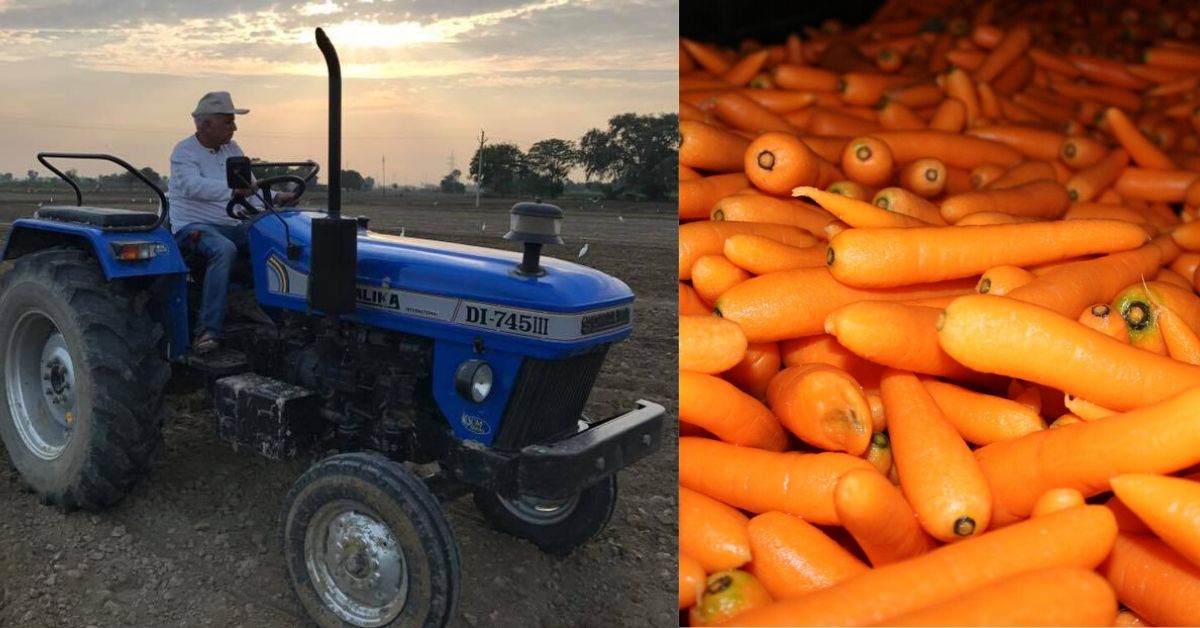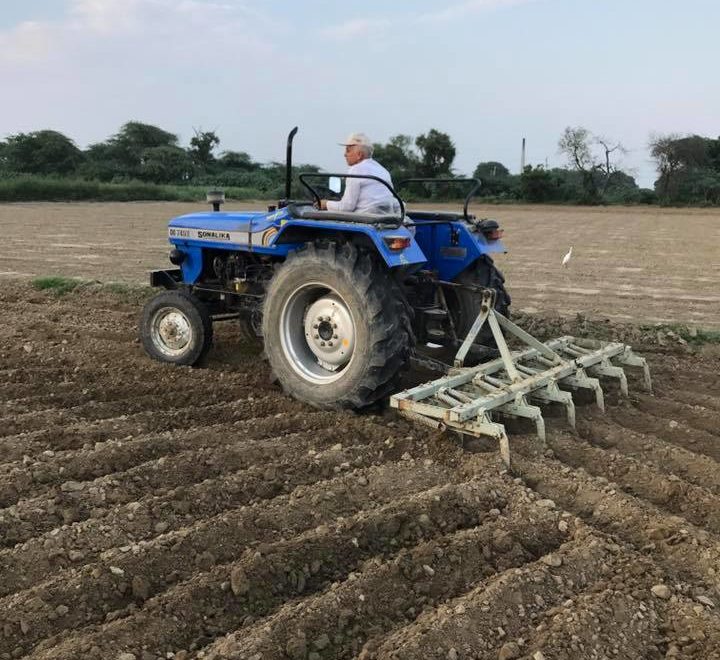Retd Colonel Turns Carrot King, Makes UP Village India’s Largest Carrot Producer
His company, Sunshine Vegetables, is one of the largest producers of English carrots in India.

Sunshine Vegetables Private Limited is one of the largest producers of English carrots in India. The company was started in 2006 by Col (retd) Subhash Deswal along with his friend, Lal Kishan Yadav.
“I served in the Indian Army for 21 years. Whenever I would go home during the holidays, my family members would talk about their farming business and how it was performing badly. Although it was true, I knew that with the right methods of farming and proper marketing, it could be successful. This thought motivated me to take early retirement, and move from Delhi to my village, Sikandrabad, which is located in UP’s Bulandshahr district,” begins Col Deswal in a conversation with The Better India.

On his return to the village, he met his friend Lal Kishan Yadav, who holds a degree in Chemical engineering and was working as a farmer and an agriculture-input dealer.
“I had very basic about farming, but Yadav knew the techniques, so we decided to join forces in 2002. We did not have land of our own, nor did we have the necessary equipment. So, we approached another farmer in Bulandshahr, leased 2 acres of his land and some equipment on lease. Then, we procured necessary seeds for potatoes, okra, onion and began farming, using the regular techniques such as manual ploughing, then sowing, adding nutrients, and watering the crops in timely intervals,” he mentions.
After a few months, the crops were ready for harvest but their produce was poor. For the next three years, the duo didn’t make any profits, and all their efforts were a failure. That is when the retired colonel decided that they needed to pause, and possibly even unlearn what they knew about farming.
Unlearning to Re-Learn
In 2005, with the idea to re-learn farming, Col Deswal approached agricultural scientists from ICAR, Punjab Agriculture University, Pantnagar Agriculture University and more.
“I travelled to many places, and directly approached scientists. Most of them were glad that a military man had taken up farming, and offered to give advice. Yadav and I assumed we knew everything about farming because our families have been doing it for generations. But we couldn’t have been more wrong, and after meeting various scientists, I learned how to increase the quality, and quantity of our produce. This was through several informal discussions, and field visits,” he recalls.
One of his key learning during this time was about the farming system in India and how farmers get trapped in debt. The commission agents in wholesale markets who are responsible for marketing the produce exploited the farmers through unscientific means of pricing.
“I was at their mercy to sell my products in the market. I wanted to break free from this vicious chain and help other farmers too. I knew it could be done through controlling 50% of the production from the village, that is when I decided to focus on growing only one crop—English carrots,” says the retired army officer.
“English carrots are high-quality vegetables that are native to Europe and not commonly grown in India, so we had an untapped market right there. We also considered the soil-type, fertility, and agro-climatic conditions. Bulandshahr has sandy-soil which is great for growing root vegetables. Then, we needed to expand, so we offered contract-based farming options to other farmers in the same district. We approached the ones growing wheat and sugarcane, as carrot cultivation offered them 2.5 more times the revenue,” he mentions.
In 2006, the duo decided to start Sunshine Vegetables Private Limited. Their mission was to focus on a single crop, bring a large number of farmers together, adopt appropriate farming methods, and establish post-harvest management infrastructure.
Scaling Production and Maximizing Profits
Once they had several farmers to cultivate carrots, the duo focussed on scaling their production and maximizing profits, by reducing their cost of production. The farming practices used before this were traditional means of land preparation, sowing, and harvesting. This proved to be expensive as it consumed a lot of time and labour. So, the retired army officer decided to minimize production costs by procuring machines to work efficiently.
“Since importing this equipment from Europe proved to be expensive, I worked along with Agri dealers, and found local manufacturers in UP, to help me build a seed sowing machine, vegetable washing machine, and harvesting machine. What cost Rs 10 lakh in Italy, could be manufactured in India at a cost of Rs 50,000. The seed-sowing machine also has an additional feature which creates soil beds before sowing,” he mentions.
Things moved smoothly until it was time to harvest the carrots. Harvesting is a highly labour-intensive process, especially in the case of root crops like carrots, and this would be a huge cost that the organisation would have incurred. Moreover, imported machinery could not be deployed for harvesting because the size of the landholding was different in foreign countries and rural India.
“A partially-mechanised technique was invented to unearth carrots and drop them safely on the group to be picked up by the labourers. This reduced labour-costs and requirement by three folds. Finally, the vegetable washing machine was made from a drum and soft scrubbers that remove all the external dirt. It was locally inspired and developed in Sikandrabad,” says Col Deswal
According to him, cold storage is the most essential part of carrot distribution. The vegetable needs to be kept at at temperature between 0 to 2-degree Celsius to remain fresh. Since there were very few cold stores in Uttar Pradesh, Col Deswal and Yadav invested in their cold storage unit. With the help of aggregators dealing with cold storage management, he set up a unit across 5 acres of land.
“Since 2007, we have been harvesting nearly 20,000 metric tonnes of carrots every March. This is the produce collected from all contract farmers and from the lands we have taken on lease. Half of it is sent directly to markets, the other half is stored. It is sent for distribution in the following months, across the country,” he explains.
The Carrot King’s Farmer Engagement Model
Along with the development of new technologies and the adoption of best farming practices, Col Deswal and Yadav felt a need to develop Farmer Engagement Models. This would build trust among the farming community, and to maintain shared values and resources.
“Some farmers had left their land uncultivated because they were under huge debt or they were not motivated anymore. We financed some of them who were interested and gave land to cultivators for lease along with necessary equipment. They carry out carrot farming and we buy back the harvest for a fixed price,” says the former army officer.
Today, Col Deswal is popularly known as the Carrot King for the quality and quantity of his produce. The company has 1000 employees (approximately 100 farmers and 900 labourers) and as mentioned earlier, produces more than 20,000 metric tonnes of English carrots every year from Sikandrabad, that are distributed across the country.
He also claims that more than 500 farmers in Bulandshahr district who cultivated rabi crops such as wheat, have diversified to growing English Carrots.
“The future of India lies in farming. More youngsters who are well-educated and technology-savvy must get into the field. It is a very respectable profession, and not a poor man’s job as it is commonly thought to be. Also, the farming business, like any other business, is profitable only when you take the time to learn and specifics and understand them thoroughly,” concludes Col Deswal.
All pictures courtesy: Colonel (Retd) Subhash Deswal
(Edited by Gayatri Mishra)
Like this story? Or have something to share?
Write to us: [email protected]
Connect with us on Facebook and Twitter.
This story made me
- 97
- 121
- 89
- 167
Tell Us More
We bring stories straight from the heart of India, to inspire millions and create a wave of impact. Our positive movement is growing bigger everyday, and we would love for you to join it.
Please contribute whatever you can, every little penny helps our team in bringing you more stories that support dreams and spread hope.



















